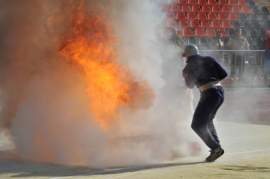
Examining Board v. Flores de Otero

Examining Board v. Flores de Otero
The territory of Puerto Rico has labor laws that are significantly different from the rest of the United States. In addition to not having “at will” employment and mandating sick, vacation, and maternity leave as well as Christmas bonuses, Puerto Rico at one point restricted who could enter particular professions on the island. These laws limited some professions to United States citizens, as a protective measure to keep foreign nationals from working in Puerto Rico for below-market wages. However, in 1976, the Supreme Court would review these laws and invalidate them.
Puerto Rico's Civil Engineer Laws
Maria Flores de Otero was born in Mexico, but became a resident of Puerto Rico (and therefore the United States) as an adult. However, she was not naturalized and was therefore not a United States citizen at the time of her lawsuit.
Puerto Rico's regulation of civil engineers was substantially more restrictive than a simple citizenship test. The territory also required specific levels of education and that all civil engineers pass a comprehensive examination of their knowledge in the field. Maria Flores de Otero was a civil engineer by trade and met all of the territory's qualifications except for citizenship. Her application to be a licensed engineer in Puerto Rico was denied when she could not produce proof of United States citizenship for the review board.
Puerto Rico's Justifications
The reason that Puerto Rico gave in Examining Board v. Flores de Otero for its discriminatory law was that it had a compelling governmental interest. The territory's government stated that it wanted to curb Spanish speaking immigration to Puerto Rico, and raise what had historically been low wages in the territory.
Supreme Court Ruling
The examining board in Puerto Rico made the argument to the federal court system that the federal courts had no jurisdiction over them. However, the Supreme Court ruled this to be untrue. The Court ruled that Maria Flores de Otero, as well as her co-petitioner, a man who had also been qualified for a civil engineering license except for his foreign (Spanish) citizenship, must be allowed to obtain an engineering license on the same basis as American citizens.
The Court ruled that either the Fifth or Fourteenth Amendment rights of Flores de Otero and her co-petitioner had in fact been violated. Typically, the difference between these two amendments being used is that the Fifth Amendment applies to federal laws, while the Fourteenth applies to state laws. Because Puerto Rico is a territory, rather than a state, there was some confusion as to which should apply. However, the Supreme Court of the United States ruled that it wasn't important which amendment had been violated—either way, the due process rights of Flores de Otero were not being correctly handled by the territory.
The Supreme Court said that the standard that should be applied in such a case is strict scrutiny, and that none of the governmental interests proposed by the examining board in Examining Board v. Flores de Otero were sufficiently compelling, nor was the law narrowly tailored enough to pass the strict scrutiny standard.


















